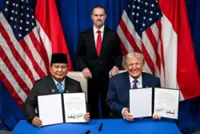JAKARTA/BATAM: An Indonesian minister said on Monday that the country is committed to developing the resource-rich island of Rempang south of Batam into an industrial park, following clashes between villagers and the police over a relocation plan.
Investment Minister Bahlil Lahadalia on Monday promised an improved plan to compensate and relocate the villagers affected by the project on Rempang, including the possibility of relocating them to an area on the island itself rather than moving them to Galang island.





